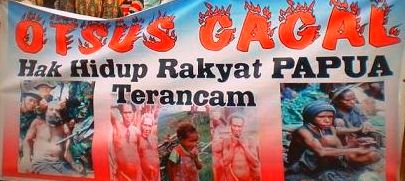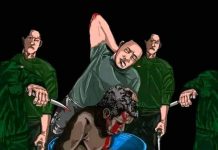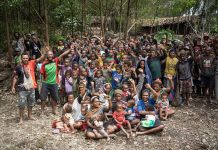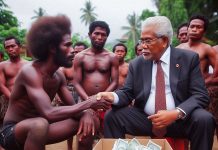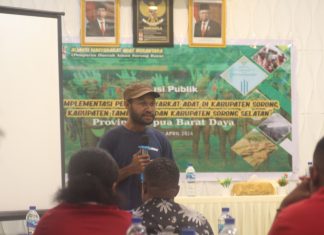Implementation of The Special Autonomy Law (Otsus) in the Land of Papua for 19 years has failed to heal the “inner wounds” of the Papuan people. Even though the Indonesian government still tries to give their best efforts to harbor aspirations for independence which always echoed by Papuan people.
Inner Wounds
As we stood on the historical fact that the government enforced Otsus amid in demands for independence by Papuan people. At that time the Papuan people declared an independence from Indonesia, as one of the decisions of the Second Papuan People’s Congress (KRP) held by the Papua Presidium Council (PDP) at the Cenderawasih APO Sports Building, Jayapura City, and 29 May-4 June 2000.
It should be noted that at the end of KRP II the Papuan people collectively issued a resolution for independence. The government responded by passing Law Number 21 of 2001 on Special Autonomy for Papua Province on November, 21st 2001. As soon as the law which was initiated by Cendrawasih University (Uncen) academics was appointed, it was suddenly rejected by the Papuan people. However, the government and Uncen institutions together with the local bourgeoisie in the Land of Papua insist on this. The political package continues to be enforced amidst increasingly strong pressure for resistance.
Although it was successfully enforced, Otsus in its realization was limping. Didn’t touch the grass root. Many times they have been protested because the spirit of Otsus has never been shown by the government in this land. The proof is that the reconciliation and judiciary institutions in Papua have never been formed by the government and even seem to be silenced. Except for the establishment of a cultural institution: the Papuan People’s Council (MRP). The delegation of authority to local governments, in reality, is not complete because it is said that they are usually limited and most of them are even completely castrated.
The odd thing is, Otsus even though it recognizes regional symbols: the Morning Star flag and the song Hai Tanahku Papua, in its implementation it has never been implemented. There is the impression of being overly afraid by the state like is the same as recognizing Papuan independence.
‘Political Phenomena”
We have followed from the beginning that there have been many reactions and political phenomena including scenarios and manipulative political rhetoric that colored the long process before and after the Special Autonomy Law was passed until it was enacted.
One of them is, on the November 11, 2001, a charismatic figure who was also a PDP leader, Dortheys Hiyo Eluay was kidnapped and killed by armed forces. The leader of the Sentani tribe from Sereh Village who was known to be an outspoken speaker of the Free Papua Movement was murdered several days after the Special Autonomy Law was appointed in the Special Session of the Indonesian Parliament. “I firmly reject the idea of autonomy. I only take care of the independence of Papuan. That is by the mandate I received…,” screamed Theys as recorded by SEM Karoba Et Al in“Papua Sues: The Politics of Autonomy of the Republic of Indonesia in West Papua! Part I: Papua Recording” (watch Papua – Galang Press, Yogyakarta, July 2004).
After that, when the President Megawati Soekarno Putri regime forced the division of the province of West Irian Jaya (IJB), which is now West Papua province. This division is against the Special Autonomy Law, but the government enforces its political will.
Four years later, to be precise in 2005, the Papuan people through the Papuan Customary Council (DAP) with one heart returned Otsus because it was deemed no longer following the wishes of the Papuan people. But the President Soesilo Bambang Yudhoyono (SBY) issued Government Regulation No. 12 of 2007 on the prohibition of regional symbols such as the Morning Star flag, the song Hai Tanahku Papua and the aspirations for an independent of Papua.
The Papuan people in the 2011 Grand Conference (Mubes) stated that they recognized the failure of Otsus in the Land of Papua. Thousands of people took to the streets to restore Otsus and at the same time demanded a referendum. The SBY regime responded by imposing the Papua and West Papua Development Acceleration Unit (UP4B).
From one policy to another does not give much color to strengthen Indonesia’s political hegemony on this rich island. Sadly, the policy is without authority for the regions. Jakarta is still in full control. That means, all authority through Otsus is like a cloud on a mountain that passes temporarily. Yes, local government is like a puppet; continue to be played like an animal they call “Papuan Monkey”.
Other phenomenon during the last few years is that the state has continued to force the division of the province in Tanah Papua. This is of course contrary to the wishes of the Papuan people, also contrary to the Otsus Law. From this fact, the state indirectly acknowledges the failure of Otsus and its distrust of Papuan officials: the Governors of Papua and West Papua, the Regents and Mayors, as well as the DPRDs throughout Papua. Including the MRP, which was formed based on the mandate of Otsus, whose voice was reluctant to be heard. So all Papuans are considered “monkeys” who are easy to make fun of and cannot be heard.
State “Expansion the Province”!
The strong impression so far has been that the central government has listened more to intelligence team. The supply of reports and studies has been used as an accurate reference for the government to adopt political policies for the Land of Papua. In addition to the plans to expand the province, and also now the revision of the Special Autonomy Law is being intensified by setting a priority for the National Legislation Program (Prolegnas) for 2020. The draft is prepared by the state according to its version and political will with the target to be completed this year.
If this is the case, should the pro-Jakarta Papuan political elite continue Otsus by trying to deny the votes of the people?
The central government gave them authority to academic institutions like Uncen and Unipa to work out the expansion of the province in Papua including the revision of the Special Autonomy Law, similar to the birth of Otsus, which was initiated by Uncen at that time. Once again, what are the attitude of the “Papuan Monkey” in the colonial bureaucracy and the local Papuan bourgeoisie that will continue to eavesdrop on Jakarta?
Expansion the province by state clearly means to control the territory, for the sake of investment and to bring in migrants and marginalize indigenous Papuans, even with the second volume of Otsus that is being discussed. Meanwhile, during the 19 years of the implementation of Otsus, many terrible facts have been experienced directly by Papuans: intimidation, racist insults, silencing of spaces of expression, killings using state instruments that lead to genocide with a series of cases of human rights violations.
Losing its Mandate
Later on November 21st, 2020, will be 19 years for the Papua Special Autonomy Law. During the implementation period, there were still gaps. The Indonesian government has not done substantive matters. Many urgent things have been neglected by the government.
The basic essence of a development movement is democracy or openness in government administration, the government’s strong attitude, and commitment to work cleanly and free from practices of corruption, collusion, and nepotism (KKN) and upholding the rule of law.
The mandate of the Special Autonomy Law is unable to guarantee life certainty, security guarantees, welfare guarantees, and so on. One of the reasons is because until now many special regional regulations (Perdasus) and provincial regional regulations (Perdasi) have not yet been worked out.
In terms of the amount of the Otsus funds according to data from the Ministry of Finance, in total since 2001, the amount disbursed from the APBN has read hundreds of trillions of rupiah. How fantastic! The funds are indeed is big. But the question is: why are the Papuan people not prosperous? That means something is wrong!
The implementation of Law 21/2001 already been evaluated several times. For example evaluated about the mandate of each article (articles 1-79); the real implementation of that mandate during the 19 years of Otsus took place (21 November 2001-21 November 2020); what must be done so that the mandate can continue?; and other aspects as stipulated in the mandate of Articles 77 and 78 of the Papua Special Autonomy Law as amended in Law Number 35 of 2008.
The results of the evaluation are known. Then, the state wants to continue volume two to prolong its failures with various colonizing successes: discrimination by differentiating the class of citizens based on skin color (racial), closing tight spaces for expression in public, castrating indigenous peoples’ rights, expanding investment areas, marginalizing Indigenous people under the domination of migrants, exploiting natural resources, killing Papuans, is that what you want? Stop it right now!
It is better to stop managing the political scenario to please the moment and miserable the owner of this golden land for a lifetime. Because, no matter how great the policy is, everyone knows that Indonesia has failed in Papua! ***


